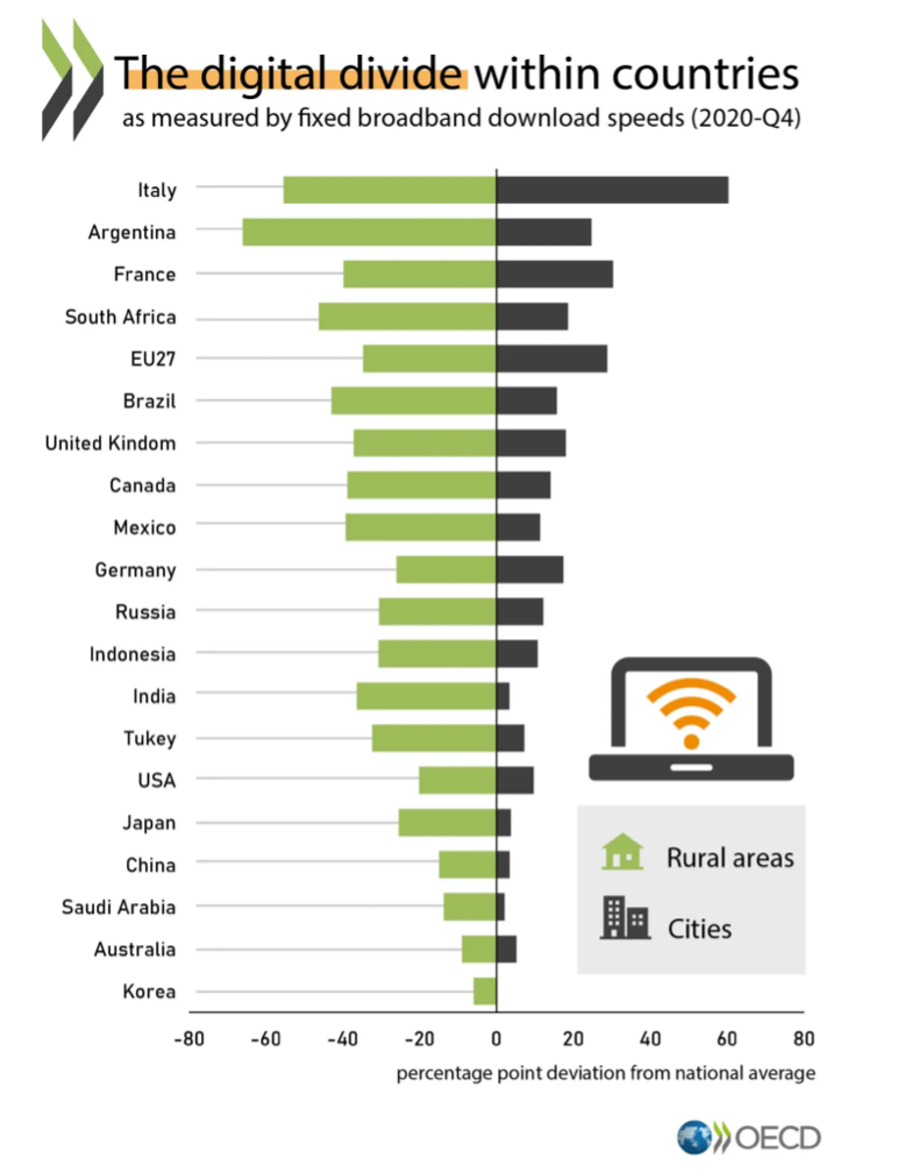Reaching Digital Deserts – Extending Access to Broadband Has Never Been So Important
by Kathy Macdonald , Michelle Marshalian , Maria Paula CaldasOokla Digital Development
The internet is crucial for us to access information, services, job opportunities, education, and more. However, while urban communities flourish in the online world, many rural communities have been left behind when it comes to ensuring fast and reliable internet access. This is in part, because of lack of access to information on digital speeds in rural areas. The Organization for Economic Co-operation and Development (OECD)’s Bridging digital divides in G20 countries leveraged data from the Ookla for Good™ initiative in their evaluation of broadband speeds across urban and rural areas within EU and G20 countries. They found that fixed broadband download speeds in rural areas were close to 50% slower than those in cities. This study underscored the need to invest in new digital connections to bridge the connectivity divide.
Challenge
Connecting people across regions has never been more important. According to the World Development Report 2021, global Internet traffic was estimated to be more than 3 zettabytes in 2020 – the equivalent of 325 million households watching Netflix simultaneously, at all times.
People depend on reliable internet connectivity because it enables them to access information, services, job opportunities, and connect to friends and family. Throughout the COVID-19 pandemic, these connections were critical in keeping many jobs, sectors and services going. Additionally, they can ensure that economic and social activities can continue in an increasingly remote manner. However, while urban communities flourish in the online world, too many rural areas remain digital deserts. Notably, many of these digital deserts remain hidden from the public eye due to poor data. For the purposes of understanding challenges, harmonized territorial and digital infrastructure data is difficult to access from national agencies, which makes it a challenge for providing evidence-based cross-country analysis on closing the digital gap.

Solution
The OECD’s Bridging digital divides in G20 countries publication leveraged data from the Ookla for Good initiative to shed new light on the problem by collecting data from users directly.
In this report, the OECD studied the differences in both fixed and mobile download speeds experienced by users in cities within EU and G-20 countries in 2020. The data revealed that rural areas experienced overall poorer network performance, highlighting the importance of placing a territorial lens on digital infrastructure policies.
The report also revealed that limited connectivity and lower fixed broadband speeds may be linked to the lower proportion of individuals with digital skills in rural areas. In some cases, the gap between the proportion of individuals with at least basic skills in cities and rural areas can reach 50 percent.

Impact
Utilizing data from sources such as Ookla for Good, the report provided crucial information about the disparities in network performance between urban and rural areas, and highlighted the necessity to close the connectivity divides. This can be achieved by investing in new digital connections through governments, subsidies for rural communities, and bottom-up initiatives such as open access or municipal-led networks.
As the accelerated adoption of teleworking during the pandemic prompted many workers and businesses to reconsider their location decisions, new digital connections could play an important role in attracting skilled workers back to rural locations, helping revitalise communities and reverse population decline.
Boosting digital skills is also key. For instance, in Australia, a rural and regional skills training initiative provides skills resources adapted to regional students and employers.
The findings of the report are critical to inform policy decisions that aid local and regional development. Our connections to the online world will increasingly shape our job prospects, social lives and access to core services. For the world’s digital deserts, these connections, along with the right support to make the most of them, cannot come soon enough.
Read more
https://oecdcogito.blog/2022/01/28/reaching-digital-deserts-extending-access-to-broadband-has-never-been-so-important/https://www.ookla.com/resources/casestudies/how-the-oecd-uses-ookla-speedtest-data-to-bridge-rural-urban-connectivity-divides